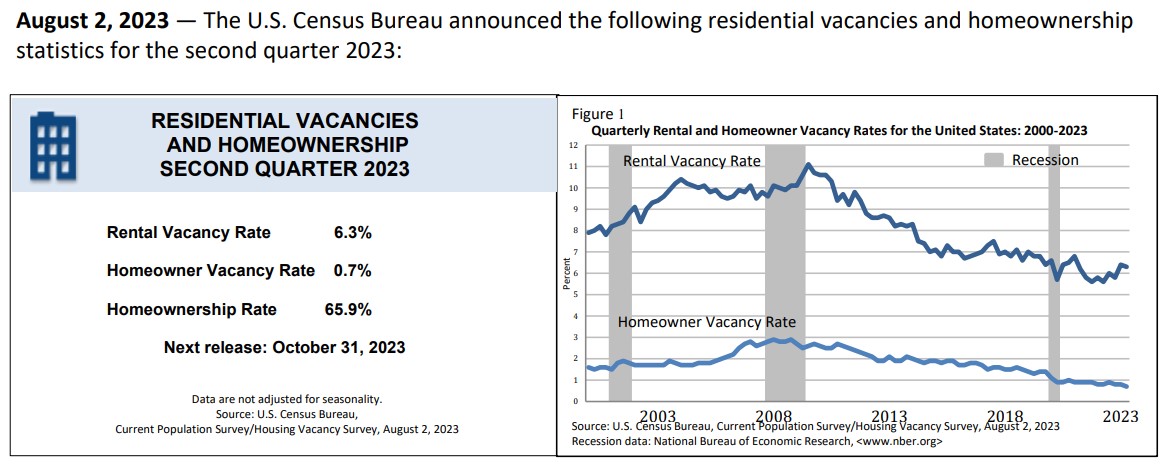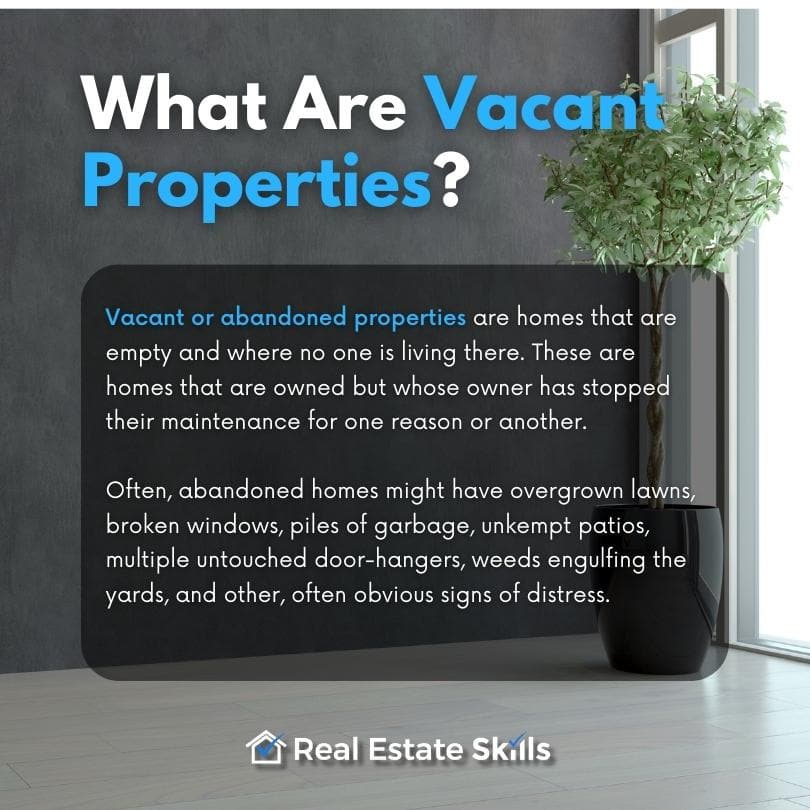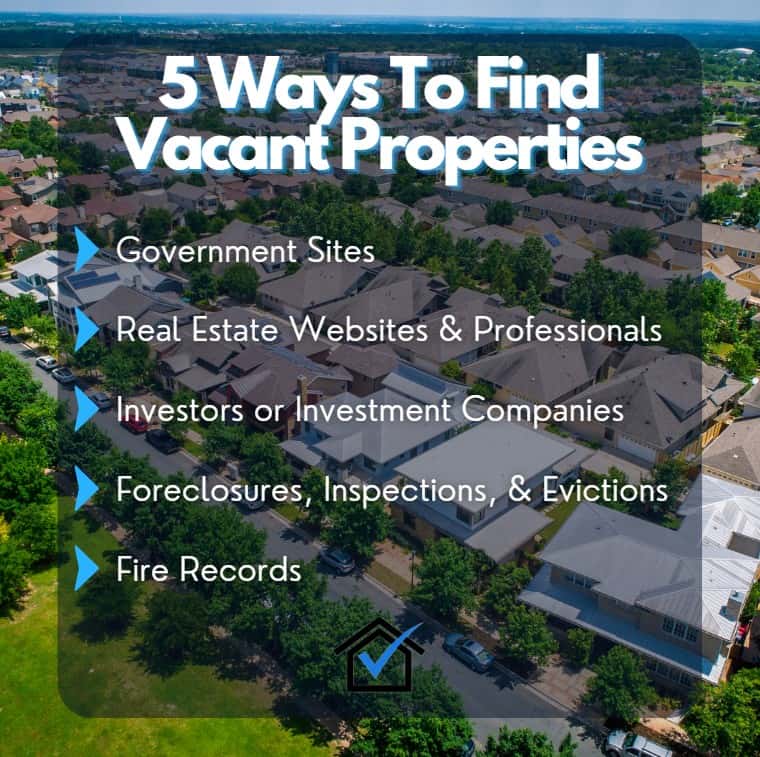
How To Find Vacant Properties: 5 Ways To Find Unoccupied Homes Near You
Sep 24, 2024
In this article, you’ll learn what a vacant house means, how to find vacant properties , and how to turn them into profits for your real estate business. Let’s dive right in.
- What Are Vacant Properties?
- How To Find Vacant Properties Or Houses (5 Tips)
- How To Find Vacant Properties In Your Area
- How To Find Vacant Properties Online
- How To Find Vacant Properties For Free
- How To Find Vacant Houses To Wholesale
- How To Find A Vacant Property Owner
- How To Find Out Who Owns A Vacant Lot
- How To Find Vacant Properties: FAQ
- Final Thoughts On Finding Vacant Properties
Ready to Take the Next Step in Real Estate Investing? Join our FREE live webinar and discover the proven strategies to build lasting wealth through real estate.
Whether you're just getting started or ready to scale, we'll show you how to take action today. Don't miss this opportunity to learn the insider tips and tools that have helped thousands of investors succeed! Seats are limited—Reserve Your Spot Now!
A rapidly growing category in the housing industry is wholesale real estate, a niche that is gaining traction quickly. According to a U.S. Census Bureau Report, "National vacancy rates in the second quarter 2023 were 6.3 percent for rental housing and 0.7 percent for homeowner housing."
The vacancy rates across regions in the USA are depicted in the following table:

These vacant homes create opportunities for a number of savvy individuals who are interested in wholesaling and investing in neglected properties.
Finding them, however, can be difficult for some. In this ultimate guide, we'll highlight methods to find unoccupied properties and determine whether or not they may provide a lucrative investment opportunity for a real estate investor.
What Are Vacant Properties?
Vacant or abandoned properties are homes that are empty and where no one is living there. These are homes that are owned but whose owner has stopped their maintenance for one reason or another.
Often, abandoned homes might have overgrown lawns, broken windows, piles of garbage, unkempt patios, multiple untouched door-hangers, weeds engulfing the yards, and other, often obvious signs of distress.

If you live in a state where the weather fluctuates drastically and cold weather causes snow or blizzards, you can even look for tracks in the snow; if there are none, and the weather has accumulated, that can be another indicator of a vacant property.
Properties may be considered vacant for one or more of the following reasons:
- Foreclosure
- Repossession
- Sheriff sale
- Tax sale situations
- Personal family reasons
- Legal proceedings
- Preparing to rent/sell
- Needs repairs or physically distressed
- Abandoned, to be demolished, or condemned
How To Find Vacant Properties Or Houses (5 Tips)
Finding homes that are vacant can seem like a difficult task, but knowing how to find vacant property list can help you access valuable resources to locate this information:

1. Government Sites
Going to websites such as www.hud.gov, www.realestatesales.gov, or www.GSA.gov can provide you with information on homes that may be available. The US Postal Service or the USPS website will also have lists of properties or abandoned buildings to which mail delivery is impacted.
Check out your county assessors' office and appraisal district for information about property ownership at a local level, as well. Simply Google search one or more of the following:
- [your county name] Central Appraisal district
- [your county name] property tax assessor
- [your county name] property lookup
2. Real Estate Websites & Professionals
Most people are aware that the MLS, or Multiple Listing Service, has homes that are available for sale or for purchase, and many of these are abandoned properties. Accessing your local MLS can lead you to information about both. Most of the homes for sale on the MLS are vacant, so this option has real potential.
*For more, watch our video on How To Get MLS Access WITHOUT A License!
Realtors with whom you keep in contact may also be a viable resource. Having a network of realtors could give you access to information regarding listings they have currently or are coming up; they may not even be on the market yet or know of pre-foreclosures.
Networking with real estate brokers or brokerages may also increase awareness regarding vacant homes, as often, multiple realtors exist with each brokerage. Go to the National Association of Realtors at www.nar.realtor to find those professionals.
3. Investors Or Investment Companies
Finding those who will invest personal dollars or are real estate investors may be as easy as a search engine like Google or speaking to your realtor contacts. Often, you can find them on social media sites, like Facebook or Instagram, While an internet search can result in a list of real estate investment companies, each of them may have their own type of investment with which they involve themselves, so this could require additional research.
Oftentimes, realtors know real estate investors who buy and rent out properties, so they could be the best resource to find those individuals.
4. Foreclosures, Inspections, & Evictions
Each county has to keep records of current foreclosures, and those are available at your request. For the most part, this can be done digitally, but in areas that are more rural, a face-to-face meeting may be required. For a list of foreclosures across the country, go to www.hudhomesusa.org/.
In the same way that realtors can help find homes, inspectors can often lend a helping hand. They may be able to provide you with information regarding homes or properties where they have worked.
Developing relationships with real estate attorneys can be incredibly beneficial in locating vacant properties. They can give you lists of those properties where tenant evictions may have taken place, meaning the home originally was used as a rental property. Having that, you can potentially locate the property’s owner and ask if there is availability to purchase. Depending on the extent of the damages the owner incurred, they may be likely to sell rather than deal with the trouble.
5. Fire Records
The local Building Department keeps records of fire-damaged properties. This list, which is available to the public because it is a public record, can be attained by submitting a document to obtain public records from them.
However, be mindful that this tactic can result in homes that need serious mitigation.
How To Find Vacant Properties In Your Area
Discovering vacant properties in your vicinity can be a goldmine for budding real estate investors or those looking to expand their portfolios. If you're wondering how to find vacant properties in my area, techniques like "Driving for Dollars," scouring estate sales, and the traditional method of door-to-door knocking can help you unearth hidden gems just waiting to be revitalized or transformed:
- Driving For Dollars: One quick way to find vacant properties is to drive through neighborhoods, or "Driving For Dollars" (D4D) as it’s called in the industry. During this process, you’d look for any visual signs that the home has been in distress. One easy way to increase your D4D success is to find others to drive around for you. Often, those who are interested in the process of finding vacant homes will ask their contacts (or those they just met) to help in finding properties, and, if they do locate something, offer them a finder’s fee. That way, even when you are not able to look for homes, your business still has the opportunity for growth and monetary gain.
- Go To Estate Sales: Looking for or going to estate sales can also be a helpful tip, as often those lead to home sales. Finding these is as easy as visiting http://www.nesa-usa.com/ or EstateSales.org to find listings close to you. They are the most reputable and up-to-date sources for information regarding an estate sale.
- Door Knocking: Often, neighbors near an abandoned home will be equally enthusiastic about your purchase of it. If the home has been run down and hasn’t been cared for, it may decrease their own property value or ability to sell. Knocking on doors and asking about the home could be an easy way to get additional information.
How To Find Vacant Properties Online
- Websites like Zillow, Redfin, Trulia, or Foreclosure.com, allow investors to find information regarding available properties.
- If looking in an area in which you do not live, you can often track down property owners, real estate agents, and other real estate professionals in order to assist you further. While this method might be less traditional (not having the physical presence of a home in front of you), any apprehension goes away with the practice of building relationships with investors or Realtors who are in your target market. Finding them is as easy as Google searching “Investor” + the zip code in which you’re looking; the same is true for realtors.
How To Find Vacant Properties For Free
The Internet is full of free resources for those who are interested in finding vacant properties. Through websites like RealtyTrac, which breaks foreclosures not only by state but also by county, you can access a free vacant property list that helps identify potential opportunities. This can be particularly useful for anyone wondering how to find vacant homes near me. There, you’re able to sort by cost, the type of homes for which you are looking, those that are bank-owned, ready for auction, or even those that are not yet listed but will be vacant shortly.
- Visit Your Local Post Office: The US Postal Service provides what’s called a “Vacant House List” a catalog of properties where mail is not being delivered due to its status of vacancy. Visit the USPS website for more information.
- Speak To The Mailman: Mail carriers will know which homes are vacant on their route. If you see yours (or another) nearby, don’t hesitate to speak to them. Their information will be up-to-date and reliable. While they may not be able to give you the owner’s name, they’ll give you a place to start.
How To Find Vacant Houses To Wholesale

A rapidly growing category in the housing industry is wholesale real estate, a practice where an individual goes into a contract on a house or piece of property before ultimately selling the contract to another buyer.
While there are innumerable online tools available to those interested in the industry, knowing how to get started can be daunting for many. As we detailed in the article, there are important details to remember when finding homes, motivated sellers, buyers, and investors, and creating a situation that’s beneficial to all parties.
According to the Freedom of Information Act (FOIA), citizens can access homes that are in probate. Probate is a “formal legal process that gives recognition to a will and appoints the executor or personal representative who will administer the estate and distribute assets to the intended beneficiaries” according to the American Bar Association.
Homes in probate can often be great options for those wishing to wholesale. Between 70-80% of houses that are in probate end up being sold within a year-and-a-half, which is an astonishing statistic, as other tactics do not have that same success rate especially when searching for vacant houses near me. Additionally, probate properties, because of the nature of this part of the real estate market, are often previously owned outright or have acquired enough equity to create significant financial gain for all parties involved.
Probate homes might require less significant upgrades or modifications, as often, they were being lived in while the deceased homeowner was still alive. However, like all methods of finding homes, wholesalers need to be cautious about the properties in question, just in case the cost to repair their damage could be more significant than the profit earned in the sale.
Read Also: How To Start Wholesaling Real Estate For Beginners In 7 Steps
How To Find A Vacant Property Owner
One aspect of wholesaling that can present difficulties would be finding the name of the owner, particularly if he or she is an absentee. To do so, you can try one or all of the following methods:
- Leave a note on the door to the property: Include your name, and phone number, and state that you’re interested in buying the home. While this method is usually unsuccessful, it can lead to someone contacting you to initiate the process.
- Going through tax records: Most of the time, these will be available to view online, although, in smaller towns, one might be required to go into the county assessor's office to attain that information. Having a property address can lead to the discovery of who the most recent owner is.
- Use skip tracing: This method can help you locate a person’s whereabouts and contact information. There are a number of different platforms for this method, many of which are available online. Some charge more than others for this service, so compare prices as you go forward with this process. Once you’ve attained their information, you can send a text or call a seller to let them know about your interests.
*When dealing with property owners, remember that for any deal, local or virtual, many homeowners with vacant properties will be excited that you are there to offer a solution to their problem! Use this as leverage.
Most likely, the home has some form of distress, and if the seller has had issues in dealing with the house, they are likely more motivated to sell.
Read Also: Virtual Wholesaling: How To Flip Houses From Home (2023)
How To Find Out Who Owns A Vacant Lot
If you've set your sights on a parcel of land with the intention to purchase, similar to the process involved in wholesaling a home, there's a plethora of methods at your disposal to identify its rightful owner. Often, local county offices, such as the assessor's or clerk's department, maintain updated land ownership records that can be accessed either in person or sometimes online. For those interested in vacant and abandoned properties near me, utilizing resources like the USPS vacant house list can be a good starting point Beyond this, you can also employ skip-tracing, a technique commonly used by investigators to locate a person's whereabouts or obtain contact information.
For those seeking a more streamlined and comprehensive approach, there are paid software platforms available that cater specifically to this need. Tools like PropStream and REIPro have made a name for themselves in the real estate sector. They provide users with the ability to swiftly uncover the identities of landowners, not just locally, but spanning the entire nation. This modern approach can save both time and effort, especially when dealing with vast tracts of land or multiple properties.
How To Find Vacant Properties: FAQ
-
What tools can I use to locate vacant properties?
You can use various tools to locate vacant properties, such as property databases like Zillow, Redfin, or local MLS listings. Additionally, apps like the Homewyse app can help with cost estimations and property details. Networking with local real estate agents and using public records can also provide insights into vacant properties.
-
How do I determine if a property is vacant?
To determine if a property is vacant, you can check for signs like overgrown lawns, unshoveled snow, or accumulated mail and newspapers. Visiting the property in person can provide visual confirmation, and you can also consult neighbors for information. Additionally, checking property tax records or local utility companies may reveal whether the property is actively occupied.
-
Is buying vacant properties risky?
Yes, buying vacant properties can carry risks, such as potential damage from neglect, legal issues related to property liens, or difficulty in financing. Vacant homes may also have hidden problems that require costly repairs. It's crucial to conduct thorough inspections and due diligence to mitigate these risks before making a purchase.
Final Thoughts On Finding Vacant Properties
Finding vacant properties is a challenging task, but it’s not one without its rewards. A wholesaler has the opportunity to create a deal that is beneficial to all parties.
If you’re looking for a step-by-step process to help you start and grow your wholesaling business without spending a dollar in marketing, check out our brand-new free training on how to find and flip your next house in 45 days or less using the MLS!
Ready to Take the Next Step in Real Estate Investing? Join our FREE live webinar and discover the proven strategies to build lasting wealth through real estate.
Whether you're just getting started or ready to scale, we'll show you how to take action today. Don't miss this opportunity to learn the insider tips and tools that have helped thousands of investors succeed! Seats are limited—Reserve Your Spot Now!
*Disclosure: Real Estate Skills is not a law firm, and the information contained here does not constitute legal advice. You should consult with an attorney before making any legal conclusions. The information presented here is educational in nature. All investments involve risks, and the past performance of an investment, industry, sector, and/or market does not guarantee future returns or results. Investors are responsible for any investment decision they make. Such decisions should be based on an evaluation of their financial situation, investment objectives, risk tolerance, and liquidity needs.








